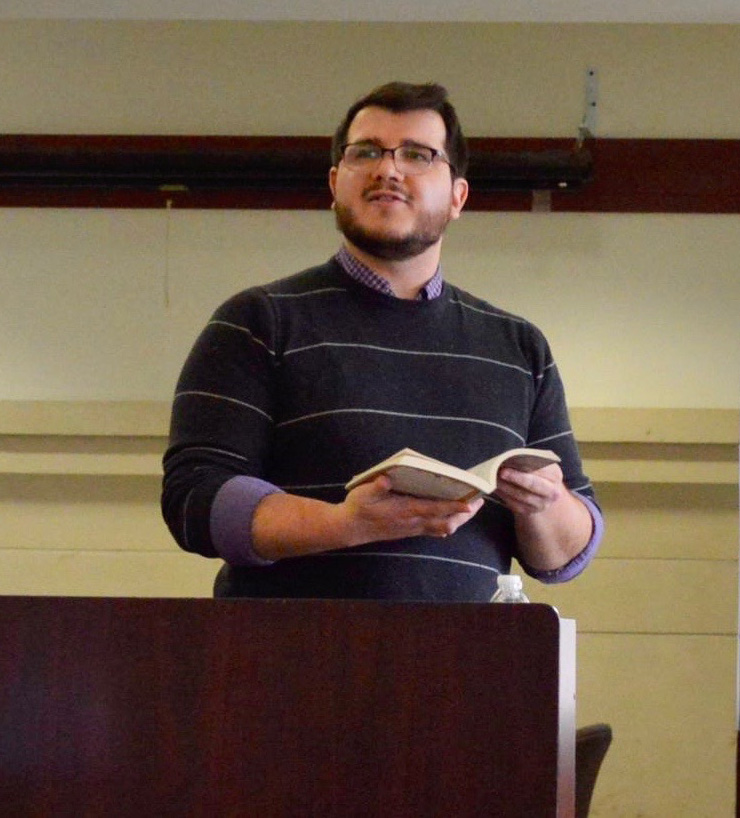 Templeton’s “Everyday Ethics” series offers us all the opportunity to engage with a range of subjects that are at once deeply important and remarkably mundane. Dan LaVenture (Cohort of 2012) acknowledged this in his talk on food. Regardless of one’s level of interest in food, LaVenture encourages us to recognize that we are part of a system of growth and consumption that is imbued with spiritual significance. We do not eat, LaVenture asserts, only to refuel and then move on with our more important activities, although nourishment is an important aspect of food.
Templeton’s “Everyday Ethics” series offers us all the opportunity to engage with a range of subjects that are at once deeply important and remarkably mundane. Dan LaVenture (Cohort of 2012) acknowledged this in his talk on food. Regardless of one’s level of interest in food, LaVenture encourages us to recognize that we are part of a system of growth and consumption that is imbued with spiritual significance. We do not eat, LaVenture asserts, only to refuel and then move on with our more important activities, although nourishment is an important aspect of food.
Cooking is an art, a spiritual act, and a social bond. In his talk, LaVenture refers to Norman Wirzba, author of Food and Faith, who draws out these facets of food. Wirzba eloquently argues for the theological importance of food: “Food is a gift of God given to all creatures for the purposes of life’s nurture, sharing, and celebration. When it is done in the name of God, eating is the earthly realization of God’s eternal communion-building love” (Food and Faith). In Wirzba’s understanding, we can participate in communion with God through our reception of His gifts in the form of food and our offering of those gifts back to him in thankfulness and celebration.
Though food seems so full of spiritual meaning, it is important to recognize that cooking is a necessary and sometimes exhaustingly repetitive task. For many, cooking means scraping together enough to fill the bellies of their children or others dependents. Countless people, particularly women, have shouldered the responsibility of providing meals for their families without the luxury of meditating on the theological importance of food. We cannot glorify the act of preparing food in such a way that we forget the hardship that surrounds food for many in our world today.
It’s become increasingly clear to me and to many others in our generation that we have been cut off from both the significance and the process of food. LaVenture recognizes this as a tragedy and encourages us to learn what we can about the ways our food reaches us. Allowing ourselves to be so removed from the process of food means that we don’t have to face the reality of the environmental impact of industrial agriculture, animal cruelty, unethical treatment of those employed in the food industry, and widespread lack of nutritious food available to the world’s population. All of these issues are severe and heartbreaking. We cannot afford to turn a blind eye, especially not as individuals who are part of an institution like Templeton that claims to pursue truth and justice.
But what does one do in the face of these issues? I was thrilled by the number of responses to LaVenture’s talk. During Q&A, several students asked wide ranging questions about the topic, and the overall response seemed to be one of keen interest. One student in particular raised an important question: who do we need to convince about the urgency of food-related issues? LaVenture responded that every person must be engaged and encouraged to act. He also acknowledged that what is required of each person might differ. We don’t all need to become advocates for food-related policy change, but some of us do. We don’t all need to start community gardens, but a few of us should. We don’t all need to give up meat or become vegan, but some will choose this action in order to contribute to the effort. In short, while there is no one right way to respond to the current crises related to food, there is one wrong way: doing nothing.
LaVenture sparked a dialogue within the Honors Forum that must be continued. Becoming aware of our disconnectedness to food systems is the beginning of our long road of learning to become engaged again. Our generation is one that is aware of the consequences of disengaging from food and yearning to fix what seems terribly broken. Rediscovering the spirituality, delight, and importance of food is well worth our time and effort.
Rachel Covert is a Templeton Scholar (2019) studying psychology. She is part of the leadership for Psi Chi, Eastern’s psychology honors chapter, and is interested in gender equality, literature, environmentalism, and music.








